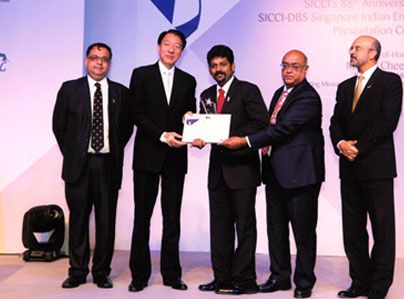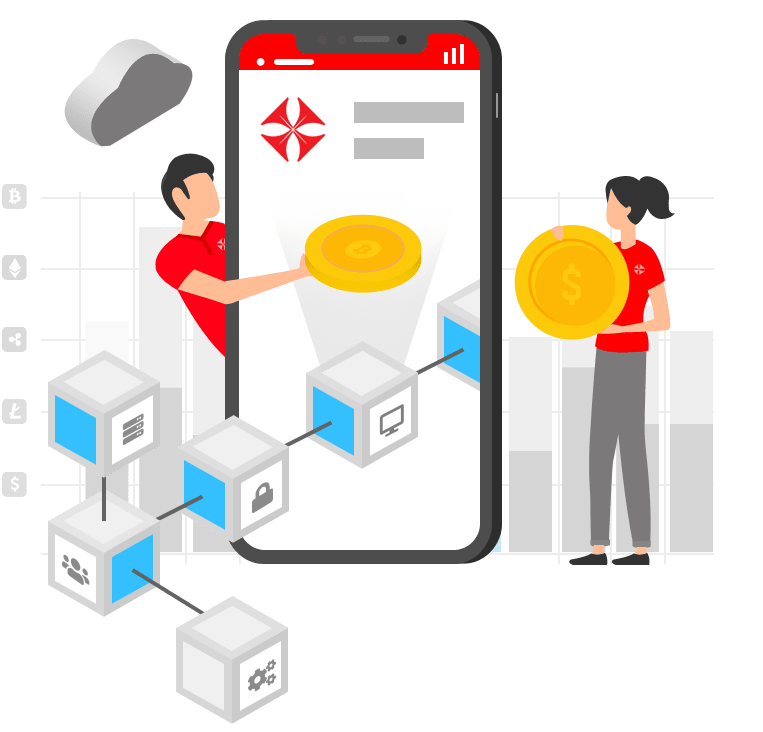“Combining Proactive and predictive assemblies to increase transparency and efficiency in the existing systems”
Blockchain Development Company
Our Blockchain technology focuses on decentralizing the entire network where single owner of the network does not arise. A copy of the ledgers of every block can be stored universally by all the users of the blockchain and the need for middlemen and trust authorities has been permanently eradicated.
What is Blockchain?
A blockchain is a developing list of archives, termed blocks linked using cryptography. These blocks comprise a cryptographic hash of the preceding block, a note of the time and operation statistics.
Fundamentally a blockchain is resilient to alteration of the data and in general sense is an openly distributed ledger that can record transactions between two parties efficiently in a verifiable and permanent way. Managed by a peer-to-peer network jointly obeying a systematic practise for inter-node communiqué and authenticating fresh added blocks the blockchain contains information that cannot be altered retroactively without revision of all ensuing blocks, which requires a confirmed consent of the entire entities of the network.
Being a decentralized, dispersed community cardinal ledger used to record businesses across many devices that cannot be altered retroactively, without the revision of the successive blocks, allowing the members to confirm and audit the relevant businesses autonomously.
Blockchain Development
A blockchain can be designated as a value exchange practice allocated to the account that it can maintain title rights. When such a system is properly set up it provides a record that compels offer and acceptance. Advantage of an open blockchain network is that guarding against immoral elements particularly is not required and no access control is needed which means that applications can be added to the network. On the other hand permissioned blockchains use an access control layer to govern the access to the network.
Structure and system of a block chain consists of blocks that hold batches of valid transactions that are hashed and encoded. Each block comprises the cryptographic hash of the previous block, linking the two. This iterative process confirms the integrity of the previous block, all the way back to the original. In certain cases separate blocks can be produced concurrently, creating a temporary fork. A blockchain has a definite set of rules for scoring diverse forms of the information so that one with recent information stands updated.
Blockchains are characteristically put together to add the tally to new blocks onto old blocks and are given enticements to cover new blocks rather than overwrite old blocks. Hence, the chance of an entry becoming out-dated declines. Organizations of the financial sector are implementing distributed ledgers for use in banking because it has potential to speed up back office settlement systems. There are mainly four types of blockchain networks which are classified as public blockchains, private blockchains, consortium blockchains and hybrid blockchains. A public blockchain has absolutely no access restrictions. A private blockchain is the one which needs permissions. As a part of the ever expanding horizons, Xsosys has been into offering block chain solutions thereby joining hands with the contemporary technologies and staying on par with the challenging environments.
Blockchain Development Process We Follow
01
Requirement Gathering
Requirement gathering is the process of defining user expectations for a new blockchain being built or modified. It encompasses those tasks that go into determining the needs or conditions to meet for a new or altered blockchain, taking account of the possibly conflicting requirements of various stakeholders.
02
Suitable Blockchain Platform
A number of blockchain platforms are made use of nowadays. Ethereum is one of the highly active and open sources Blockchain which forms the base for development of other applications. Hyper ledger Fabric is to boost the use of Blockchain technologies across different industries. Multichain used to create permission network. Hydrachain it is used to create private ledger which is useful for the enterprises. Ripple It helps connect banks, digital assets exchanges, and payment providers and send money globally with ease. R3 Corda focusses on interoperability ease of integration with the legacy system. BigChainDB an open-source Blockchain platform is majorly useful for companies who are looking for handling digital assets. IOTA for the creation of both public and permissioned network supports nano payments.
03
Crypto Currency
Another digital asset used in the working as a medium of exchange is the crypto currency. This uses a very high level of cryptography to enable a secure and safe financial transaction. This mechanism operates through a circulated journal expertise in which the blockchain serves as a public financial transaction database.
04
Decentralized Blockchain
In a decentralized blockchain every node has a copy of the blockchain. Here the data quality is maintained by trust of computation. Since there is no centralized copy the users are equally trusted. The transactions are validated using stamping schemes and the mining nodes add to the validations
05
Blockchain Security Methods
Fundamentally the security aspect is drawn from the cryptography and bitcoin design. The incorporation of Merkle trees and including documents into one block along with other security attributes, the security of the system becomes multifold. Additional techniques that can leverage further enhancing the security and privacy of blockchains are incorporated accordingly.
06
Support & Maintenance
We provide maintenance and support at varying levels to meet exact needs. Management of blockchains are done through a variety of secure technologies that include advanced and proven methods like pro-active observing, root-cause study, precautionary upkeep, service endurance and incessant development in the firmness and accessibility of requests. Applying a strong service methodology based on standard operating procedures we meet offer excellent support and maintenance.












